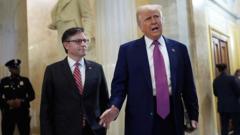The House of Representatives has narrowly passed President Trump's extensive tax and spending bill, stirring intense partisan divides. While supporters celebrate potential economic gains and tax cuts, critics raise alarms about significant Medicaid and food assistance cuts and their long-term consequences on lower-income populations. The bill now heads to the Senate, where further modifications are anticipated amid looming fiscal concerns.
House Republicans Approve Trump’s Controversial Tax and Spending Bill

House Republicans Approve Trump’s Controversial Tax and Spending Bill
In a narrow vote, the House passes a significant tax and spending package championed by Trump, igniting fierce debates among lawmakers and prompting economic concerns.
House Republicans recently achieved a pivotal victory by passing President Donald Trump's ambitious tax and spending legislation, commonly referred to as his "big, beautiful bill." The tie-breaking vote resulted in a narrow margin of 215 to 214, with two Republicans breaking ranks to support the Democrats, and one member voting present. This victory for Trump and House Speaker Mike Johnson follows weeks of contentious negotiations with conservative factions within the party.
Johnson triumphantly declared this legislative step as a crucial success, asserting that it would restore a sense of prosperity among Americans. The legislation extends tax cuts initially enacted during Trump's earlier term in 2017 and bolsters funding for defense and immigration enforcement initiatives. Significant features include the temporary removal of taxes on overtime and tips—campaign promises that played a role in Trump's successful re-election bid in 2024.
Despite this celebration, the bill's substantial spending cuts raised alarms, as it proposes reductions to vital programs such as Medicaid and Snap, which serve millions of low-income Americans. The push to authorize these cuts incited tension among Republican lawmakers, culminating in Trump's direct intervention, where he urged lawmakers to override their dissent or risk repercussions.
Opposition from Democrats was fierce, with Minority Leader Hakeem Jeffries warning of the dire implications for vulnerable populations including children, the elderly, and individuals with disabilities. He stressed the risks of hospital closures and service disruptions if the cuts are enacted.
Financial analysts express concern over the bill's projected $5.2 trillion addition to national debt and an anticipated $600 billion budget deficit for the upcoming fiscal year. These developments have not gone unnoticed, as evidenced by recent adjustments to the U.S. credit rating by Moody’s, primarily citing rising debt levels.
The Senate now faces the task of deliberating the bill, potentially amending its provisions before sending it back to the House for yet another crucial vote. Among the initial hurdles is navigating a Congressional Budget Office report warning that the proposed debt increase could invoke automatic cuts to Medicare, a program Trump had vowed to protect.
Democrats are prepared to leverage this vote against Republicans in the forthcoming midterm elections, emphasizing detrimental effects on social services and tax breaks favoring the wealthy. As the narrow Republican majority remains subject to political fluctuations, the upcoming elections could threaten Trump's legislative ambitions, potentially permitting Democrats to regain control of the House.





















